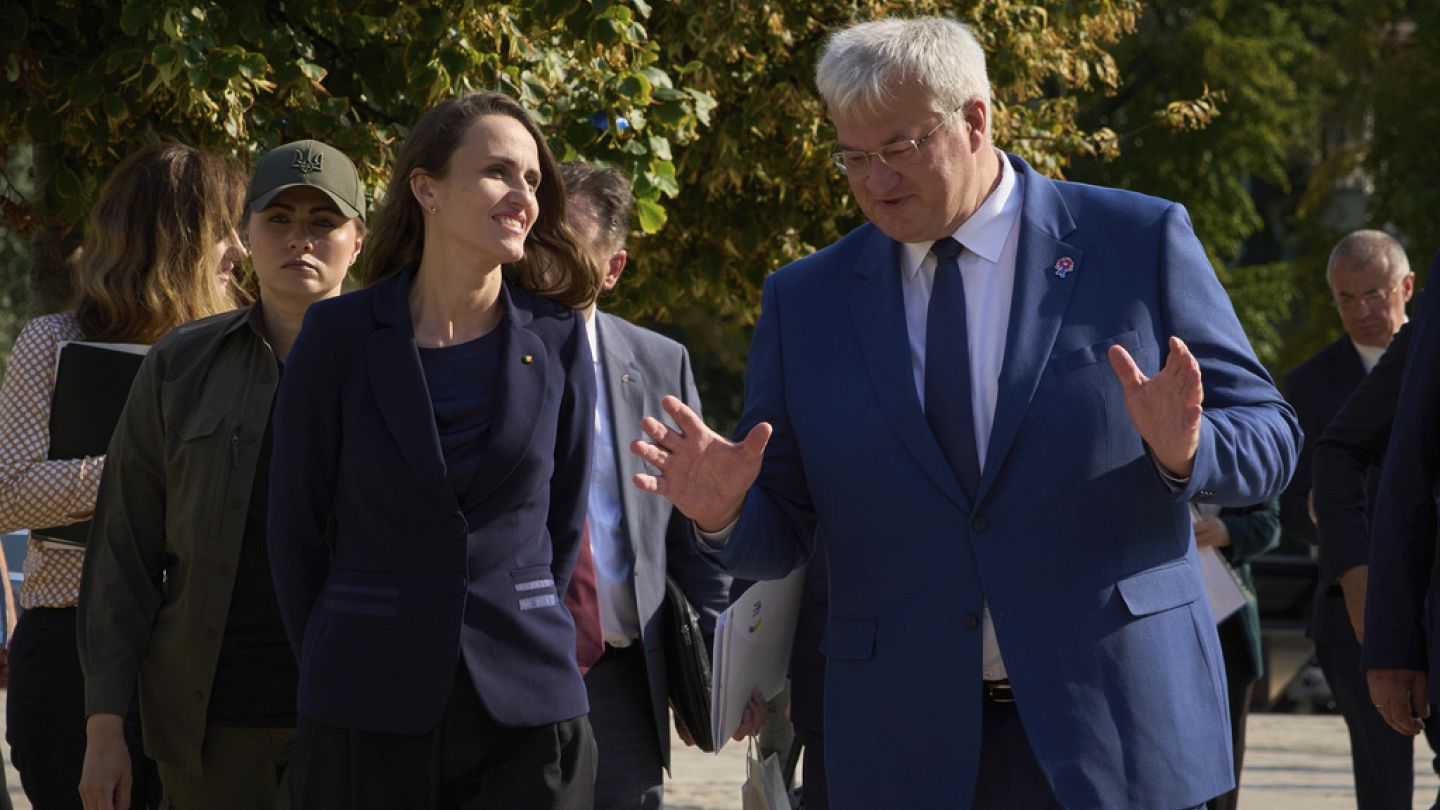
Romanian Foreign Minister Oana Țoiu has told Euronews that the European Union needs to push through “decision-making reforms” to accelerate its enlargement process and by-pass the veto power of individual member states.
Speaking with Euronews’ 12 minutes with…, minister Țoiu was asked whether Moldova’s EU accession process should be decoupled from Ukraine’s, which is currently stalled due to the veto of Hungarian Prime Minister Viktor Orbán.
Both Kyiv and Chișinău’s bids have been coupled since they became official EU candidates in the immediate aftermath of Russia’s full-scale invasion of Ukraine, meaning Orbán’s veto has indirectly held Moldova back from opening the first cluster of talks.
Țoiu, who became Romania’s top diplomat in June, stressed that the real issue lay with the blocking of Ukraine’s process.
“It’s time to unblock Ukraine as well. I think that is very important now,” she said, explaining that both Moldova and Ukraine are “much more ahead than the EU collectively acknowledges.”
“We need to make sure […] that we have the proper decision making reforms, because it is clearly not just the merit of Moldova, the merit of Ukraine, Albania, Montenegro and so on.”
She described Orbán’s isolated attempt to stall Ukraine’s progress as “irresponsible.”
“It is clearly a problem that we have for ourselves if the will of twenty-six countries is blocked irresponsibly just by one single vote. And we need to do the proper reforms, but also fully use the current framework that we have to move forward,” Țoiu said.
Reforms to side-step veto
The issue is expected to be discussed when leaders gather for a summit in Brussels next week.
European Council President António Costa has in recent weeks been leading a push to advance Ukraine’s application for EU membership and find a way to side-step Hungary’s opposition.
Costa’s proposal would allow the bloc to open each step in a country’s accession bid, known as ‘negotiating clusters’, with the support of a so-called qualified majority of countries.
This means it would require the approval of just 15 of the EU’s 27 countries, representing at least 65% of the population. The current rules require the unanimous backing of all leaders for the opening of each step.
Pressed on whether Romania’s government will explicitly back this proposal, Țoiu would not be drawn, but said “Romania thinks we need to move faster and we need to make sure we do not block our common decisions.”
Draft conclusions for the summit, seen by Euronews, do not include a specific section on the enlargement as is customary. But the text does note in relation to Moldova that the Council “encourages the Republic of Moldova, the Council and the Commission to take work forward on the accession process, in line with the merit-based approach.”
Budapest has invoked various reasons to justify its veto on Ukraine’s application, ranging from the continuation of Russia’s war, concerns about energy security and the situation of the Hungarian minority inside Ukraine.
For this reason, the first cluster of the negotiations, known as fundamentals — covering key topics such as democracy, human rights, security, the judicial system and public procurement — has not been opened with neither Ukraine nor Moldova.
The bloc has so far resisted decoupling both their accession paths, fearing the move could dent Ukraine’s hopes as the war with Russia rages on and as efforts to reach a ceasefire agreement continue.
Țoiu spoke to Euronews hours before President Trump announced he was looking to meet with Russia’s President Vladimir Putin in Hungary to try to resolve the war in Ukraine.
Yet there are fears that letting Orbán’s veto indirectly hold back Moldova could feed into the hands of the Kremlin, which has been accused of waging a hybrid war on the country of 2.4 million people.
The pro-EU PAS party of President Maia Sandu recently won parliamentary elections in Moldova, despite widespread reports of vote-buying and rigging. There are fears a protracted EU accession progress could feed into the hands of anti-EU forces.